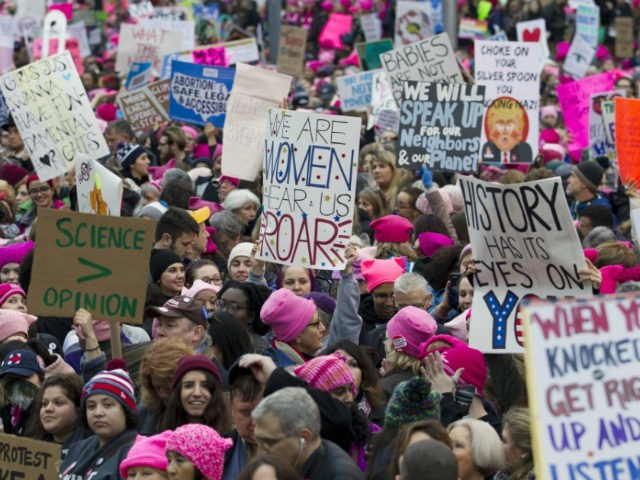The tens of thousands of women marching in the anti-Trump Women’s March on Washington demonstration in Washington, D.C., Saturday are “mostly white” and experiencing “therapy” for their anxiety over Hillary Clinton’s election loss to Donald Trump in November, the Washington Post reports.
Planned Parenthood tweeted:
According to the Post:
Marchers — mostly women and mostly white — said they came to take the most public possible stand against Trump, a candidate and now president whom they said routinely insults women and the issues they care about. But the gathering also provided therapy for many, the balm of immersing themselves in a like-minded sea of citizens who had shared their anxiety and disappointment after Democrat Hillary Clinton’s historic bid for the presidency ended in defeat.
The report notes some of the women are “sometimes sleeping on the couches of people they had never met before” due to the vast crowd participating in the march.
“Organizers, who originally sought a permit for a gathering of 200,000, said Saturday they now expect as many as a half million participants – potentially dwarfing Friday’s inaugural crowd,” the report says:
The march’s central focus appears to be to protect abortion chain Planned Parenthood from taxpayer defunding, one of the stated goals of the Trump administration. Though cast as a “women’s rights” march, pro-life women who attempted to register for the march were refused.
“If you want to come to the march you are coming with the understanding that you respect a woman’s right to choose,” Linda Sarsour, a Palestinian-American Muslim racial justice and civil rights activist, and a chairwoman of the event, told the New York Times.
Feminist Gloria Steinem and Planned Parenthood have partnered for the event, providing it with its decidedly anti-Trump tone.
On her website, Steinem says to her fans:
We have all the powers we had [before Trump was elected] of lobbying and pressuring and making clear that the political consequences are great. We may look up and feel powerless and think there’s nothing we can do, but it’s not true. There are things we can do at each level. And there’s always civil disobedience. Trump is not my president.
Steinem also recently said she would refuse to pay the full amount of her federal income tax if Planned Parenthood’s taxpayer funds were eliminated.
Planned Parenthood President Cecile Richards said about the march:
We will send a strong message to the incoming administration that millions of people across this country are prepared to fight attacks on reproductive health care, abortion services, and access to Planned Parenthood, as they intersect with the rights of young people, people of color, immigrants, and people of all faiths, backgrounds, and incomes.
According to the march’s website, its mission is to “send a bold message to our new government on their first day in office, and to the world that women’s rights are human rights.”
Democrat Sens. Patty Murray (WA) and Elizabeth Warren (MA) are supporting Planned Parenthood:
Despite its message of unity among all the left’s political identity groups, the Times previously reported the “Women’s March” has been anything but unified from its inception:
On the march group’s Facebook page, it is easy to see how complicated the idea of the “women’s vote,” an already mythological concept, has become, and how difficult it might be for organizers to fulfill their aim of gathering women who remain fiercely divided on reproductive rights, gun control, same-sex marriage and immigration, among other issues.
Not everyone on the page believes, for instance, that Hillary Clinton would have made a good president, or that Stephen K. Bannon, a chief strategist under Mr. Trump, holds divisive views about minorities. Debates over both have sprung up in recent days. Bob Bland, one of the march’s organizers, said in an email that organizers in Maryland had to change a Facebook page from public to private to protect the safety of women who want to attend.
Writing at the Week, abortion rights supporter Shikha Dalmia asserts the demonstration has already failed in its mission.
“Demonstrations serve a useful function in a democracy — but only when they have clarity of purpose,” she writes, adding that the march is “shaping up to be a feel-good exercise in search of a cause.”
Dalmia writes some of the “absurdity” related to the event stems from “the fact that they are billing this event as the voice of women when 42 percent of women (and 62 percent of non-college educated white women) actually voted for Trump.”
She also observes “the almost-comical progressive hysteria over the event’s name.” The initial plan by the “three white women” organizers, she says, was to call the event the “Million Women March,” but the women were criticized for “cultural appropriation” for “allegedly poaching the heritage of the 1997 Million Woman March for black women.”
“Feminists are confusing the issue by making Trump’s threat about themselves,” Dalmia concludes. “If they really wanted to help, they would have kept their powder dry for now, rather than embark on this confused and pointless march.”

COMMENTS
Please let us know if you're having issues with commenting.